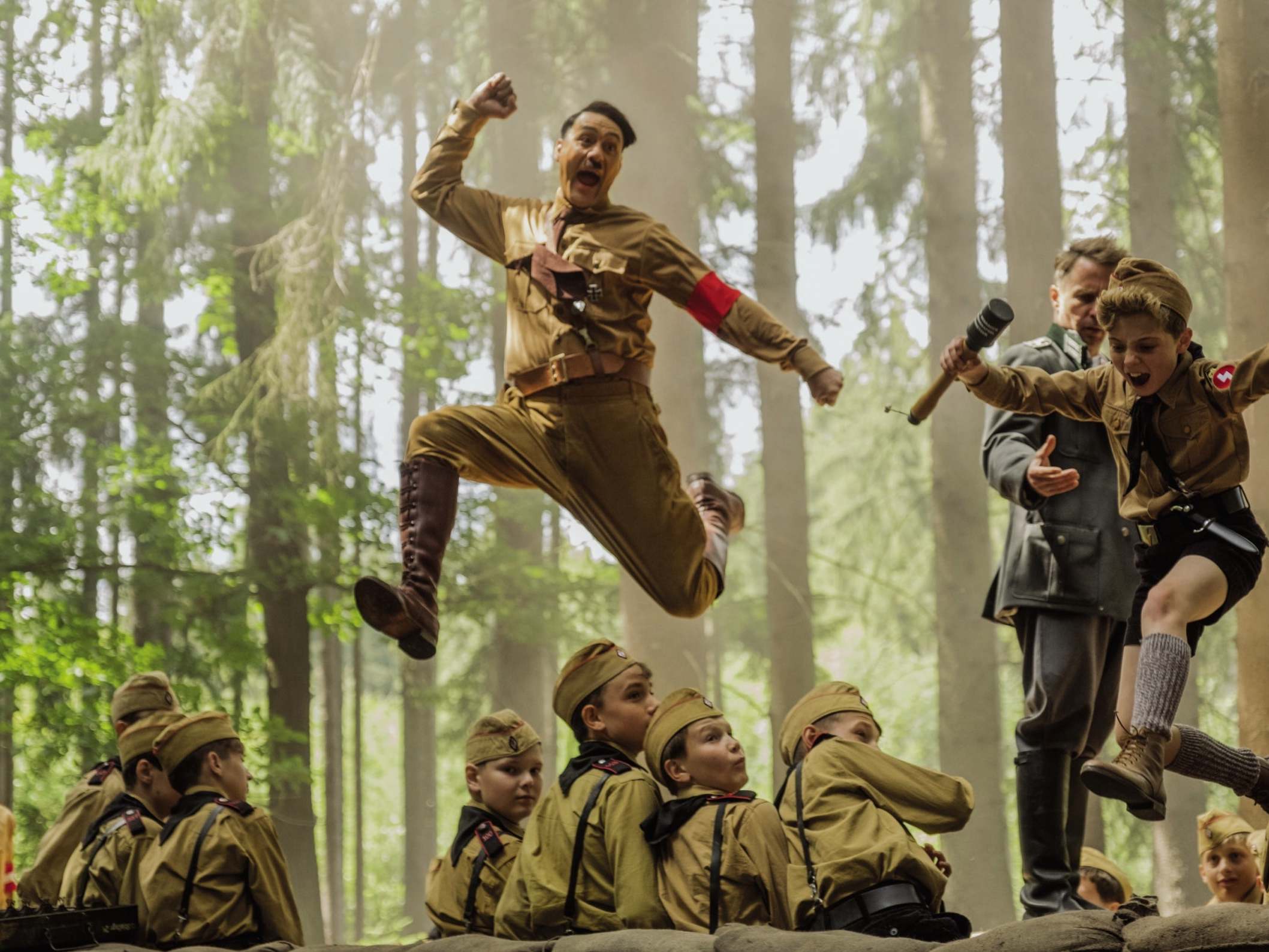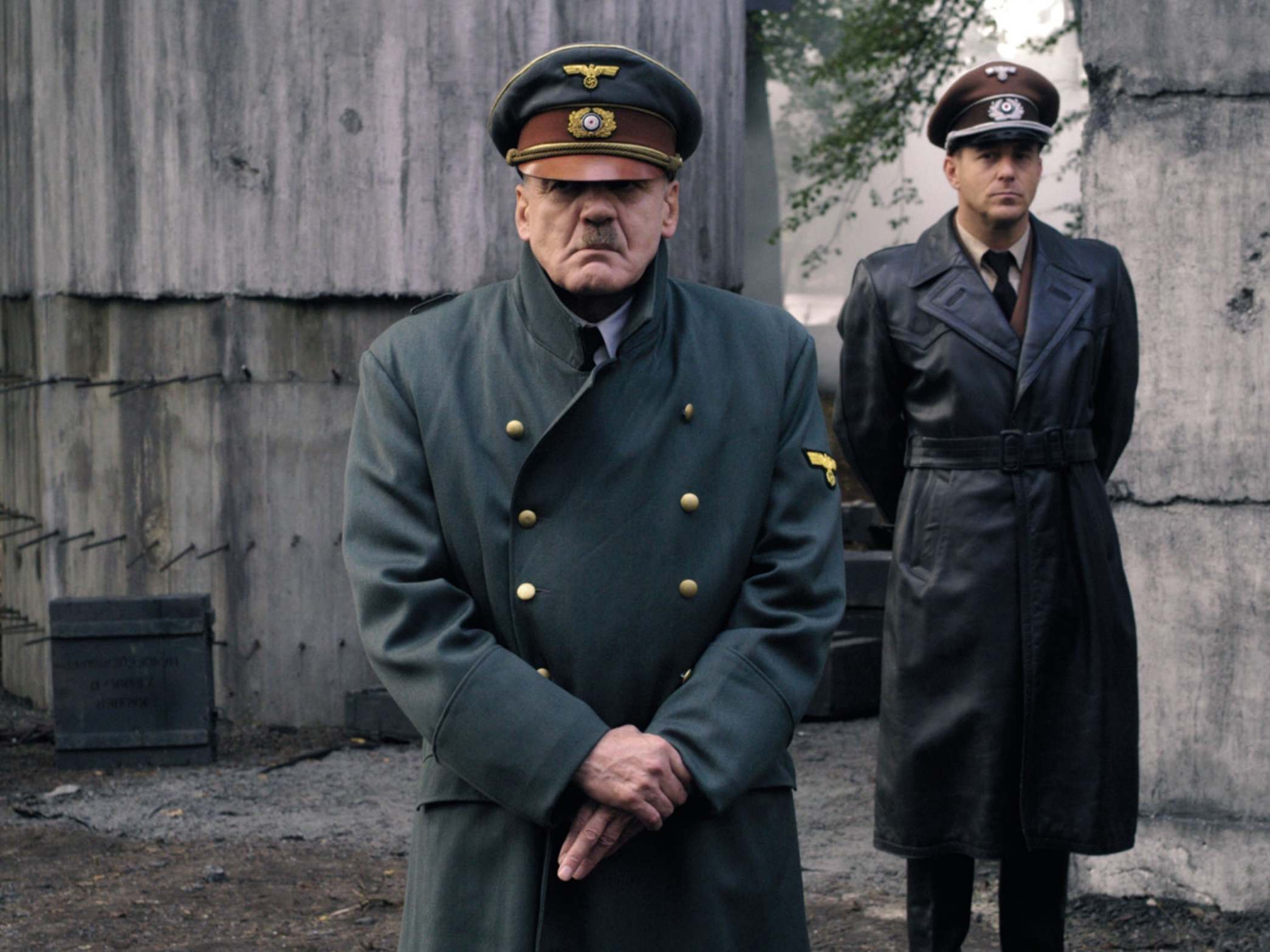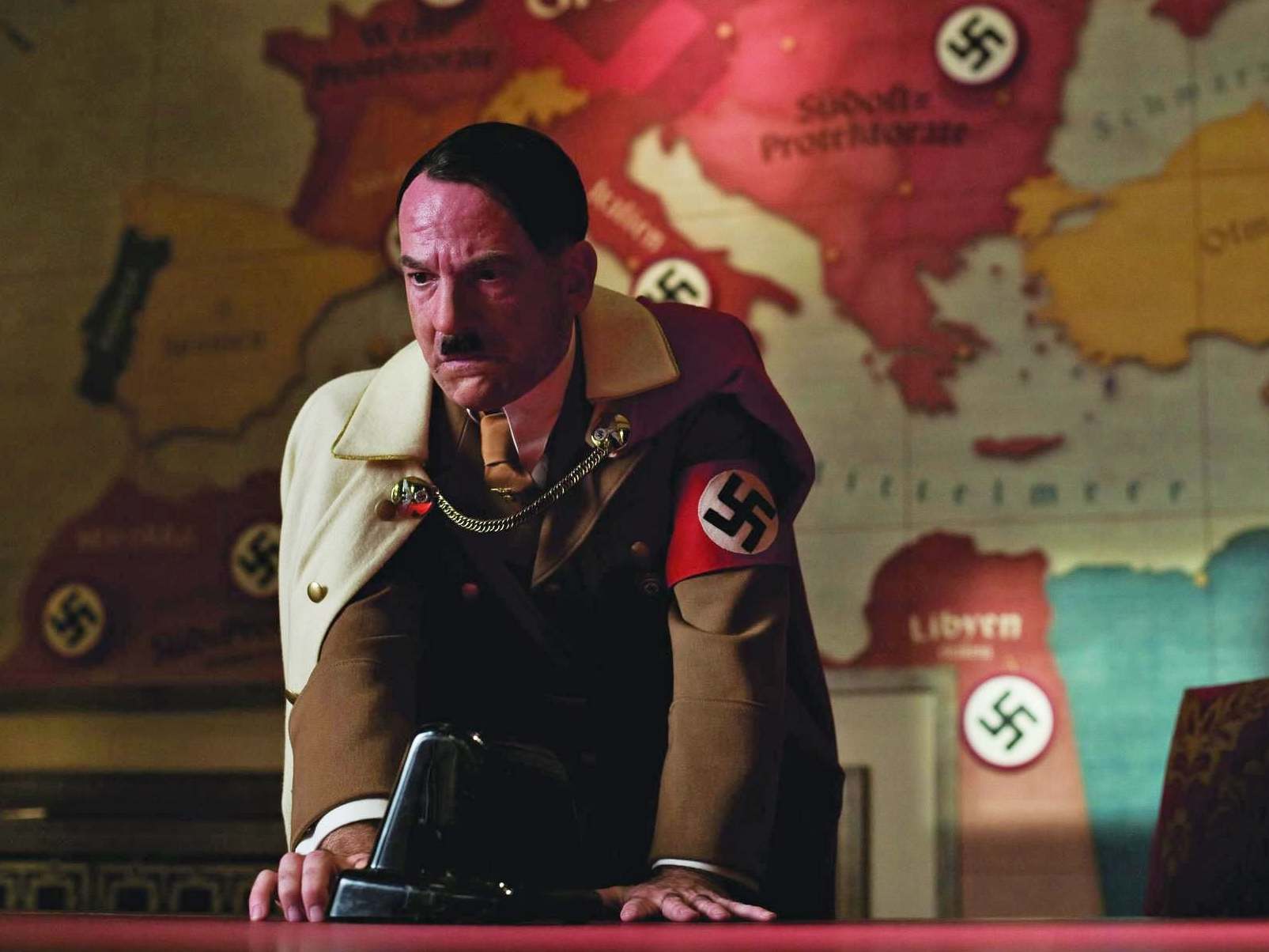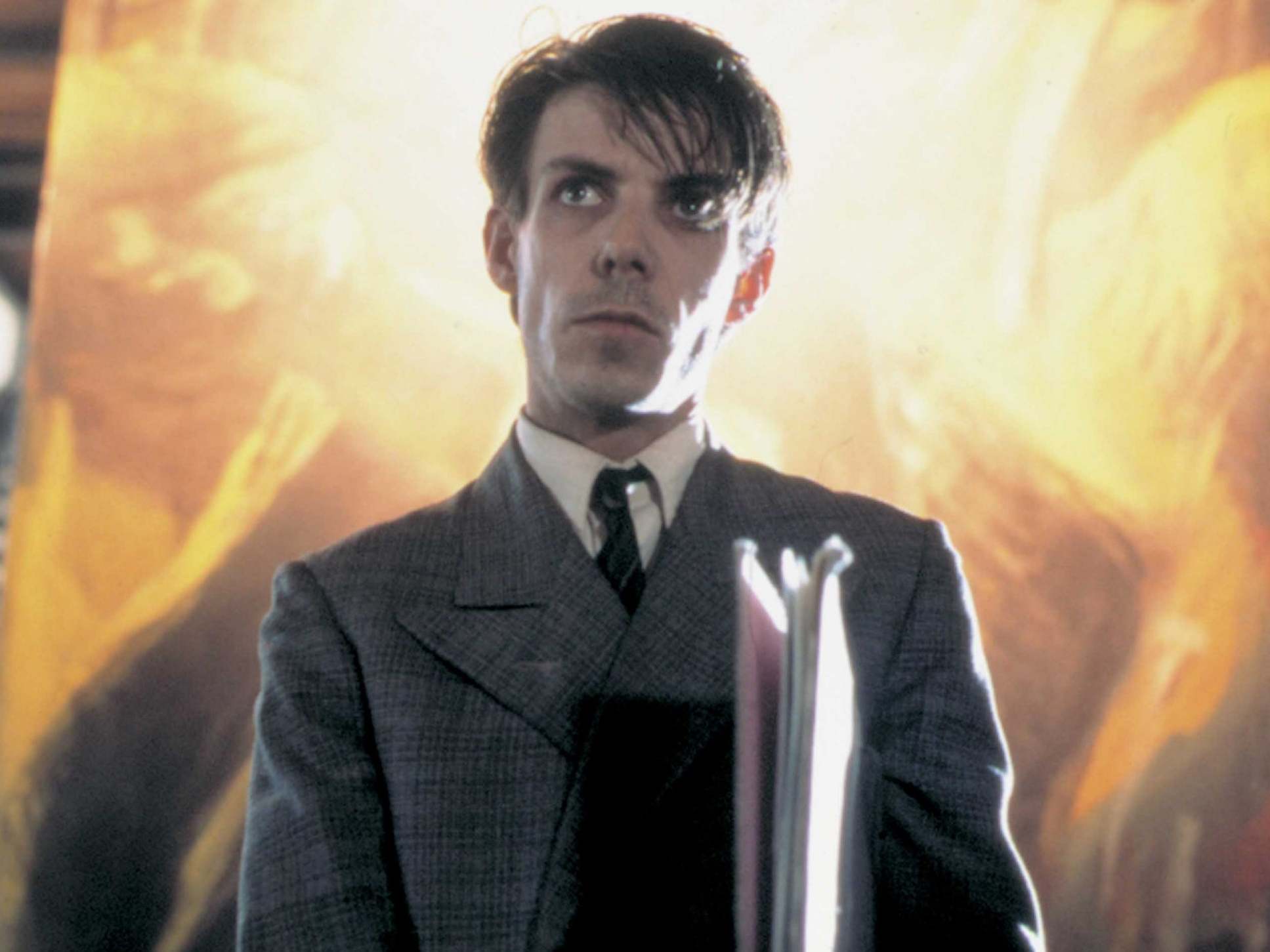Hitler is presented as a comic character in ‘JoJo Rabbit’ – but do filmmakers risk trivialising his evil actions by humanising him?
People’s memories of the homicidal insanity are clearly receding into the distance if Hitler is now able to feature in films like Taika Waititi’s, as the young hero’s imaginary best friend, says Geoffrey Macnab

Hitler is back on screen... again. One of the most fiercely debated films at the Toronto Film Festival last week was New Zealand actor-director Taika Waititi’s satirical new comedy JoJo Rabbit. It is about a nervous young boy in the Hitler Youth in late wartime Germany who negotiates his way through life with the aid of an imaginary friend, none other than the Fuhrer himself (played by Waititi). This is the Third Reich used for a coming-of-age story, a Nazi movie with the flavour of The Secret Diary of Adrian Mole, Aged 13¾.
Scarlett Johansson plays the boy’s mum. While Hitler advocates genocide, she is hiding a young Jewish girl to keep her out of the Nazis’ hands.
Understandably, the film (which receives its UK premiere at the London Film Festival next month) has split opinion. At a pre-festival press briefing, LFF artistic director Tricia Tuttle described it as “really funny and moving ... a satire about challenging hate” and as “terrific filmmaking”. Director-star Waititi called it “a love letter to mothers”. In his Toronto press conference, he justified the decision to make a heart-tugging family comedy set against the backcloth of Hitler, antisemitism and the Holocaust. “We have to keep remembering and keep finding new and inventive ways of telling the same story so children can listen and grow and move forward unified and with love in the future,” Waititi said.
Some critics took extreme exception to his approach, calling it “totally irresponsible” and “wrong-headed”.
Regardless of the strengths or weaknesses of JoJo Rabbit as storytelling, the film underlines the strange transformation in popular culture of Hitler. In cinema, in particular, he has become a universal symbol of comic-book evil, fantasy and (in the case of JoJo Rabbit at least) even whimsy. He now turns up in comedies, sci-fi films and musicals, as well as in earnest historical dramas and horror movies. The more he rages on screen, the more he seems like a Chaplinesque caricature of himself. It is becoming harder and harder for filmmakers to take the little man with the moustache seriously.
The most nuanced screen portrayal of Hitler on screen in recent times was that of Bruno Ganz in Oliver Hirschbiegel’s Downfall (2004), set in Berlin at the end of the Second World War. As The New Yorker put it, Ganz’s portrayal made Hitler into “a plausible human being”. The film was successful and was nominated for an Oscar. Nonetheless it remains popular today primarily because it is so ripe for parody. Ganz’s onscreen rants have been coopted countless times for YouTube spoofs. “Hitler interviews Justin Bieber”, “Hitler finds out Arsene Wenger will leave Arsenal” and “Hitler phones an Indian call centre” are just some of the re-edited videos which milk Ganz’s onscreen tantrums for comic effect. The Hitler played by Martin Wuttke in Quentin Tarantino’s Inglourious Basterds (2009) was in a similar mould, a man who drives himself into such paroxysms of rage that he looks as if he is about to have a stroke. It’s a vaudeville turn in which Hitler’s motivations are secondary. He is there to blow off as much steam as possible.
Filmmakers have also recently shown a morbid obsession with imagining the alternative life Hitler might have led if he had survived the war and was somehow still around today. German box-office hit Look Who’s Back (2015), directed by David Wnendt, imagined him waking up bedraggled on a park bench in Berlin-Mitte in 2014. As he emerges from his slumber, no one can take him seriously. He is treated not as the Great Dictator but as a lovable street comedian – just another eccentric in a society full of them. Everyone wants selfies with him. He thinks the world has gone mad and is appalled to see Angela Merkel – “a clumsy woman with the charisma of wet noodle”, as he calls her – leading the German people.

Look Who’s Back followed on from another German comedy a few years before, Dani Levy’s Mein Führer:The Truly Truest Truth About Adolf Hitler (2007), which portrayed the Fuhrer suffering from acute depression at the end of the war and summoning an old Jewish acting coach from a concentration camp to help him make an important speech. Reviewers raged against its lack of decent jokes and its “sympathetic” portrayal of Hitler.
“The taboo is not lifted. There’s still a lot of resentment and a lot of fear. If you laugh about such destructive times, it feels as if you are making fun of the victims,” Levy acknowledged in an interview to promote the film’s release. It was an astute remark, which partly explained why German critics were so hostile to the film.

Both Levy and Wnendt were born long after the war and were chafing against restrictions imposed on them by their parents’ generation. Nonetheless, their films felt very superficial. So did Menno Meyjes’s Max (2002), in which Noah Taylor played the future dictator as a penniless artist and vagabond in post-war Munich. “When people say I am humanising him, I don’t think they mean that. They all know he wasn’t born in a cloud of sulphur ... this guy was just a guy, just a frustrated guy. [The film] demystifies him. The Hitler myth has become so calcified, and it was important to break that open,” said Meyjes in justification of his approach to telling the story of the young Hitler.
The danger was that in breaking the myth open, Meyjes and other filmmakers did indeed risk trivialising the apocalyptic suffering unleashed by their subject. The fact that he was “just a guy” was neither here nor there. They were inviting audiences to empathise with him and even to feel sorry for him. By humanising him, they were distorting the traditional picture of him and, however obliquely, trying to explain and justify his behaviour. It was as if they were suggesting that Hitler, like Joaquin Phoenix’s uber-villain in new film The Joker, wasn’t fully to blame for his actions, that his background and life experiences turned him into the monster he became.

Some films portraying Hitler have so many layers of irony to them that they can get away with ideas that might otherwise have seemed utterly tasteless. That was the case with Graham Rose’s short Mrs Meitlemeihr (2002), set in bomb ravaged post-war London where Hitler (Udo Kier) tries to pass himself off as a housewife but struggles to escape the attentions of an amorous Jewish neighbour. Kier also played Hitler as a Tyrannosaurus-riding madman on the moon in Timo Vuorensola’s sci-fi comedy Iron Sky: The Coming Race (2019).
Of course, as many historians have pointed out, there was always a perverse comedy and pathos in Hitler’s story. He really did look like Charlie Chaplin – and was born in the same week in the spring of 1889. His father had grown up as Alois Schicklgruber and only changed his surname in his mid-thirties. If his son had kept that name, his political ambitions may well have been stymied. “I have heard Germans speculate whether Hitler could have become master of Germany had he been known to the world as Schicklgruber ... can you imagine the frenzied German masses acclaiming a Schicklgruber with their thunderous ‘Heils’?” American journalist William L Shirer asks in his study, The Rise and Fall of The Third Reich.
In the early 1940s, filmmakers like Chaplin and Ernst Lubitsch picked up on Hitler’s everyman/Schicklgruber quality and mocked him for it. However, at the time Chaplin was making The Great Dictator (1940), he had little knowledge of the full horrors of the Third Reich. As he later wrote in his autobiography, “had I known of the actual horrors of the German concentration camps, I could not have made The Great Dictator, I could not have made fun of the homicidal insanity of the Nazis.” Lubitsch’s wondrously witty comedy To Be or Not to Be – which opens with Hitler seemingly on a shopping trip, looking for tasty morsels at Jewish delicatessens in downtown Warsaw in 1939 – was made in 1942, likewise before the full extent of the Nazi genocide was known.
People’s memories of the homicidal insanity are clearly receding into the distance if Hitler is now able to feature in films like JoJo Rabbit as the young hero’s imaginary best friend.
It is often said that the best way to undermine dictators is to laugh at them. Once they are ridiculed by their own people, their power begins to seep away. That is why senior Nazis reacted so badly to being mocked. As Rudolph Herzog points out in his book Dead Funny: Humour in Hitler’s Germany (2011), during the Third Reich, people were condemned to death for telling even the most anodyne jokes about Hitler. The flip side, though, is that using humour today in movies set during the Hitler era is to risk distracting audiences from the systematic violence and antisemitism that Hitler and his cronies oversaw. If filmmakers are going to give their young characters imaginary friends, maybe they should stick to giant rabbits like the one who took such good care of James Stewart in Harvey (1950) and leave the men in swastikas alone.
‘JoJo Rabbit’ screens at the London Film Festival on 5 October
Join our commenting forum
Join thought-provoking conversations, follow other Independent readers and see their replies
Comments
Bookmark popover
Removed from bookmarks